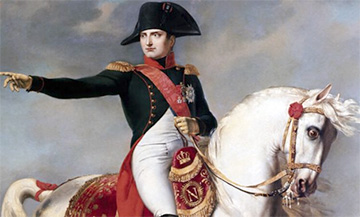World History
Napoleon Bonaparte
- 07 Sep 2021
- 7 min read
Why in News
A newly discovered hat with DNA evidence proving it belonged to Napoleon Bonaparte has gone on display at an auction house in Hong Kong.
Key Points
- Brief Profile:
- Born on 15th August, 1769, in Ajaccio, on the Mediterranean island of Corsica.
- Also known as Napoleon I.
- A French military leader and emperor who conquered much of Europe in the early 19th century.
- Crowned himself emperor in 1804.
- Died on 5th May, 1821, on the island of St. Helena.
- Born on 15th August, 1769, in Ajaccio, on the Mediterranean island of Corsica.
- Rise of Napoleon Bonaparte:
- French Revolution: Napoleon Bonaparte rapidly rose through the ranks of the military during the French Revolution .
- He is considered a child of the French Revolution (1789-1799).
- As a young leader he quickly showed his support for the Jacobins, a far-left political movement and the most well-known and popular political club from the French Revolution.
- He fought in the French Revolutionary Wars and was promoted to brigadier general in 1793.
- Treaty of Campo Formio (1797): After victories against the Austrians in northern Italy, he negotiated the Treaty of Campo Formio.
- Battle of the Nile (1798): He attempted to conquer Egypt (1798–99) but was defeated by the British under Horatio Nelson in the Battle of the Nile.
- The Coup of 18 Brumaire (1799): In this event, Napoleon was part of a group that successfully overthrew the French Directory.
- The Directory was replaced with a three-member Consulate, Napoleon became first consul, making him France’s leading political figure.
- Battle of Marengo (1800): Napoleon’s forces defeated one of France’s perennial enemies, the Austrians, and drove them out of Italy.
- The victory helped cement Napoleon’s power as first consul.
- Additionally, with the Treaty of Amiens in 1802, the war-weary British agreed to peace with the French (although the peace would only last for a year).
- French Revolution: Napoleon Bonaparte rapidly rose through the ranks of the military during the French Revolution .
- The Reign of Napoleon Bonaparte:
- Napoleonic Wars: From 1803 to 1815, France was engaged in the Napoleonic Wars, a series of major conflicts with various coalitions of European nations.
- Louisiana Purchase: In 1803, partly as a means to raise funds for future wars, Napoleon sold France’s Louisiana Territory in North America to the newly independent United States for $15 million, a transaction that later became known as the Louisiana Purchase.
- Battle of Trafalgar: In October 1805, the British wiped out Napoleon’s fleet at the Battle of Trafalgar.
- However, in December of that same year, Napoleon achieved what is considered to be one of his greatest victories at the Battle of Austerlitz.
- His army defeated the Austrians and Russians.
- The victory resulted in the dissolution of the Holy Roman Empire and the creation of the Confederation of the Rhine.
- However, in December of that same year, Napoleon achieved what is considered to be one of his greatest victories at the Battle of Austerlitz.
- Reforms Initiated By Napoleon:
- Napoleonic Code: On 21st March, 1804, Napoleon instituted the Napoleonic Code, otherwise known as the French Civil Code, parts of which are still in use around the world today.
- It forbade privileges based on birth, allowed freedom of religion, and stated that government jobs must be given to the most qualified.
- It included criminal code, military code & code of civil procedure and commercial code.
- The Napoleonic Code followed Napoleon's new constitution, which created the first consul.
- First consul was a position which amounted to nothing less than a dictatorship.
- Abolished Serfdom and Feudalism: Napoleon Bonaparte abolished “serfdom and feudalism” in the country in order to make the people free.
- Serfdom, a condition in medieval Europe in which a tenant farmer was bound to a hereditary plot of land and to the will of his landlord.
- Feudalism was the system in 10th-13th century European medieval societies where a social hierarchy was established based on local administrative control and the distribution of land into units (fiefs).
- Education: Napoleon set up an elaborate system of schools, called lycées, which is still in use, and was a proponent for universal education.
- Napoleonic Code: On 21st March, 1804, Napoleon instituted the Napoleonic Code, otherwise known as the French Civil Code, parts of which are still in use around the world today.
- Fall of Napoleon:
- Continental System: It was the blockade designed by Napoleon to paralyze Great Britain through the destruction of British commerce; it proved largely ineffective and eventually led to Napoleon's fall.
- Peninsular War (1807–1814): It was the military conflict fought by Spain, the United Kingdom and Portugal against the invading and occupying forces of France for control of the Iberian Peninsula during the Napoleonic Wars.
- Invasion of Russia: Napoleon hoped to compel Tsar Alexander I of Russia to cease trading with British merchants through proxies in an effort to pressure the United Kingdom to sue for peace. The official political aim of the campaign was to liberate Poland from the threat of Russia.
- The great French dominion collapsed rapidly after the disastrous invasion of Russia in 1812. Napoleon failed to conquer Russia in 1812 for several reasons: faulty logistics, poor discipline, disease, and not the least, the weather.
- Napoleon was defeated in 1814 and exiled to the island of Elba, before returning and was finally defeated in 1815 at Waterloo.





